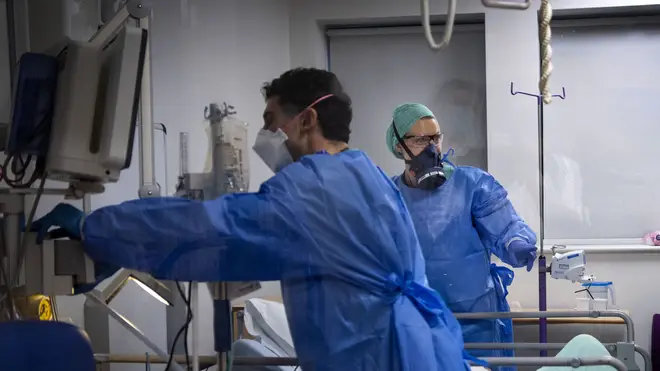
Iain Dale 10am - 1pm
13 January 2021, 20:55 | Updated: 13 January 2021, 21:00

Boris Johnson says the risk of intensive care units being overwhelmed is "very substantial"
Intensive care units (ICUs) are at a "very substantial" risk of being overwhelmed unless Covid rates are brought under control, Boris Johnson has warned.
The prime minister admitted to the Commons Liaison Committee that intensive care wards in hospitals could be unable to cope if coronavirus infections continue to rise in the UK.
It comes as the country saw a new daily death toll record on Wednesday, with 1,564 fatalities recorded within 28 days of a positive test.
The figures mean Britain has now surpassed the grim milestone of more than 100,000 deaths involving Covid-19, according to official data.
Speaking to MPs, Mr Johnson said he could not give a prediction for when ICU capacity is likely to be saturated.
"But all I can say is that the risk is very substantial and we have to keep the pressure off the NHS and the only way to do that is to follow the current lockdown," he said.
Read more: Brazil's Covid variant a cause for 'concern', Boris Johnson warns
Read more: UK records 1,564 new Covid-19 deaths in highest-ever daily figure

According to the latest figures on the government's Covid dashboard, more than 36,000 people are in hospital with the virus and of those almost 3,500 are currently requiring ventilation.
The prime minister told the committee that the situation facing the NHS "is very, very tough indeed" and that "the strain is colossal" on staff.
Mr Johnson also expressed concern about a new variant of coronavirus seen in Brazil. However, the PM refused to announce an outright ban on travel from the South American country.
"We already have tough measures... to protect this country from new infections coming in from abroad," he said.
"We are taking steps to do that in respect of the Brazilian variant."
Exclusive: Van-Tam tells LBC he is 'comfortable' with vaccine second dose delay
Watch: Van-Tam says not to worry about vaccines working against new strains

Boris Johnson admits he is 'concerned' about new Brazilian Covid variant
The UK leader also refused to guarantee that England's schools will reopen to all pupils after the February half-term, saying it depended on issues such as progress in the vaccination programme or whether vaccine-resistant strains had emerged.
"The priority is obviously to get schools open as soon as possible," he said.
During Prime Minister's Questions earlier on Wednesday, Mr Johnson said 24/7 vaccinations would take place "as soon as we can", although the supply of doses remained the main barrier.
He added that Health Secretary Matt Hancock will set out further details "in due course".
Earlier, Mr Hancock questioned whether there would be demand for round-the-clock vaccination operations as "most people want to get vaccinated in the daytime, and also most people who are doing the vaccinations want to give them in the daytime".
Labour leader Sir Keir Starmer said he understood that pilot 24-hour centres were not yet open to the public but there would be a "huge clamour" for them.

Professor JVT explains why second vaccine dose is being delayed
Meanwhile, the NHS said high street pharmacies in England will be able to distribute Covid vaccines from Thursday.
A YouGov poll of 2,137 British adults found 43 per cent would be willing to have a vaccination appointment between midnight and 5:59am, while 32 per cent would turn it down.
It also revealed that two-thirds would attend an appointment between 8pm and 9:59pm and 53 per cent would go between 10pm and 11:59pm.
More than 2.6 million people across the UK have so far received a first dose of the coronavirus vaccine.
In Scotland, vaccinations could begin on a 24-hour schedule when mass centres open in late February or early March, the country's Health Secretary, Jeane Freeman, said.
The Oxford/AstraZeneca vaccine provides the most straightforward route to protect around 15 million of the most vulnerable people by mid-February because it is logistically less complicated than the Pfizer jab, which needs to be kept deep-frozen.
Tom Keith-Roach, president at AstraZeneca UK, said: "We are scaling up very rapidly and this will happen imminently to releasing two million doses a week."
Listen & subscribe: Global Player | Apple Podcasts | Google Podcasts | Spotify